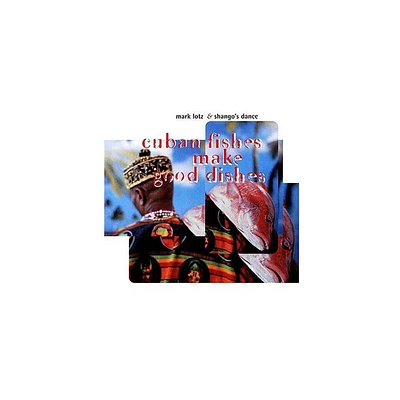Home
Cuban Fishes Make Good Dishes
Loading Inventory...
Barnes and Noble
Cuban Fishes Make Good Dishes
Current price: $18.99


Barnes and Noble
Cuban Fishes Make Good Dishes
Current price: $18.99
Loading Inventory...
Size: OS
*Product Information may vary - to confirm product availability, pricing, and additional information please contact Barnes and Noble
Flute player
Mark Lotz
is from the Netherlands, but that doesn't keep his
Afro-Cuban
excursion
Cuban Fishes Make Good Dishes
from sounding remarkably authentic. Although traditional
jazz
instruments like flute, piano, bass, reeds, and horns make appearances on most of these 14 songs (the moody
ballads
"Sweet Ochun"
and
"Yewa's Call"
most notably), the album's focus is on
traditional
forms related both to Cuban music and to the Caribbean religion of Santeria: chants in the Yoruba language and rhythms played on the
trio of bata drums predominate. On a couple of songs, particularly
"A Shuffle for Ochun,"
the chants and drums are placed against traditional
instrumentation, for a sound pleasingly similar to
Sun Ra
's vocal tracks. On most of the album, however, the
Cuban music and
Lotz
's
interpretations of same are kept largely separate. This is a shame, because this is one cross-cultural
album that doesn't use its
world
music influences as a sort of
exotica
wraparound on the same old
post-bop
workouts, and a greater commingling of
's cerebral European
sensibility and the earthy immediacy of the Yoruba vocals could potentially have been even more entertaining. Despite the terrible, cutesy album title, this shouldn't be missed. ~ Stewart Mason
Mark Lotz
is from the Netherlands, but that doesn't keep his
Afro-Cuban
excursion
Cuban Fishes Make Good Dishes
from sounding remarkably authentic. Although traditional
jazz
instruments like flute, piano, bass, reeds, and horns make appearances on most of these 14 songs (the moody
ballads
"Sweet Ochun"
and
"Yewa's Call"
most notably), the album's focus is on
traditional
forms related both to Cuban music and to the Caribbean religion of Santeria: chants in the Yoruba language and rhythms played on the
trio of bata drums predominate. On a couple of songs, particularly
"A Shuffle for Ochun,"
the chants and drums are placed against traditional
instrumentation, for a sound pleasingly similar to
Sun Ra
's vocal tracks. On most of the album, however, the
Cuban music and
Lotz
's
interpretations of same are kept largely separate. This is a shame, because this is one cross-cultural
album that doesn't use its
world
music influences as a sort of
exotica
wraparound on the same old
post-bop
workouts, and a greater commingling of
's cerebral European
sensibility and the earthy immediacy of the Yoruba vocals could potentially have been even more entertaining. Despite the terrible, cutesy album title, this shouldn't be missed. ~ Stewart Mason


















